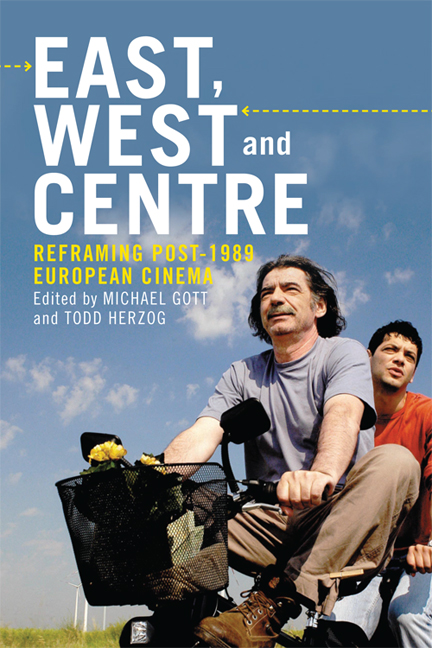Book contents
- Frontmatter
- Contents
- List of Figures
- Notes on Contributors
- Acknowledgements
- Introduction: East, West and Centre: ‘Mapping Post-1989 European Cinema’
- Part I Redrawing the Lines: De/Recentring Europe
- Part II Border Spaces, Eastern Margins and Eastern Markets: Belonging and the Road to/from Europe
- 8 Contemporary Bulgarian Cinema: From Allegorical Expressionism to Declined National Cinema
- 9 The Point of No Return: From Great Expectations to Great Desperation in New Romanian Cinema
- 10 ‘Weirdness’, Modernity and the Other Europe in Attenberg (2010, Athina Rachel Tsangari)
- 11 Lithuania Redirected: New Connections, Businesses and Lifestyles in Cinema since 2000
- 12 Lessons of Neo-liberalism: Co-productions and the Changing Image of Estonian Cinema
- 13 Decentring Europe from the Fringe: Reimagining Balkan Identities in the Films of the 1990s
- Part III Spectres of the East
- Notes
- Bibliography
- Index
13 - Decentring Europe from the Fringe: Reimagining Balkan Identities in the Films of the 1990s
from Part II - Border Spaces, Eastern Margins and Eastern Markets: Belonging and the Road to/from Europe
Published online by Cambridge University Press: 05 September 2016
- Frontmatter
- Contents
- List of Figures
- Notes on Contributors
- Acknowledgements
- Introduction: East, West and Centre: ‘Mapping Post-1989 European Cinema’
- Part I Redrawing the Lines: De/Recentring Europe
- Part II Border Spaces, Eastern Margins and Eastern Markets: Belonging and the Road to/from Europe
- 8 Contemporary Bulgarian Cinema: From Allegorical Expressionism to Declined National Cinema
- 9 The Point of No Return: From Great Expectations to Great Desperation in New Romanian Cinema
- 10 ‘Weirdness’, Modernity and the Other Europe in Attenberg (2010, Athina Rachel Tsangari)
- 11 Lithuania Redirected: New Connections, Businesses and Lifestyles in Cinema since 2000
- 12 Lessons of Neo-liberalism: Co-productions and the Changing Image of Estonian Cinema
- 13 Decentring Europe from the Fringe: Reimagining Balkan Identities in the Films of the 1990s
- Part III Spectres of the East
- Notes
- Bibliography
- Index
Summary
During the Cold War the Iron Curtain marked a clear-cut division between ‘us’ and ‘them’. From the point of view of Western Europe, the continent was inhabited by two distinct ‘tribes’: the civilised ‘West’ and the exotic, often uncivilised ‘others’ (Buchowski 2006: 465). The fall of the Berlin Wall in 1989 disrupted these boundaries and brought an uneasy shift in collective identities, provoking, as Michał Buchowski summarises, ‘confusion, uncertainty, cognitive dissonance, symbolic disorder, a liminal stage in the rite of passage … that needed to be worked out’ (2006: 465). The incertitude over remapping Europe triggered a revival of orientalism towards the East; as the East Central European states sought to reassert a ‘Western’ or ‘European’ identity after decades of cultural and political subjugation, the most eastern of the formerly communist countries were relegated to an ‘orientalist fringe’ of the new Europe (Iordanova 2008: 72). In the case of the Balkans, echoes of the nineteenthand early twentieth- century labelling of the region as ‘violent’ (Bakić- Hayden 917–19) and ‘ oriental’ (Livanios, 300) were frequently heard in Western media and political discourse after 1989, specifically in the context of the Yugoslav Wars of Secession in the 1990s and the ongoing project of European unification. Emphasising the importance of narrative in providing meaning to the way individuals and collectives identify themselves, their histories and their social realities – and, importantly, those of others – Igor Krstic maintains that cultural texts such as films play a vital role in constructing, reflecting and subverting narratives of identification (Krstic). Through a comparative analysis of two transnational projects by Balkanborn directors, Pred doždot/Before the Rain (Milcho Manchevski, 1994, Macedonia/France/UK) and Podzemlje/Underground (Emir Kusturica, 1995, France/Germany/ Hungary/FR Yugoslavia/Bulgaria), the Balkanproduced film Lepa sela, lepo gore/Pretty Village, Pretty Flame (Srđan Dragojević, 1996, FR Yugoslavia) and the British production Welcome to Sarajevo (Michael Winterbottom, 1997, UK), we explore how the Western gaze viewed late twentieth-century Balkan conflict through the prism of orientalism and, by so doing, narrated a causal trajectory of historical Balkan violence against which Western progress and civilisation could be affirmed. By replicating and subverting aspects of these narratives, the films at once foreground them as ideological constructions and actively participate in their reimagining.
- Type
- Chapter
- Information
- East, West and CentreReframing post-1989 European Cinema, pp. 205 - 218Publisher: Edinburgh University PressPrint publication year: 2014



